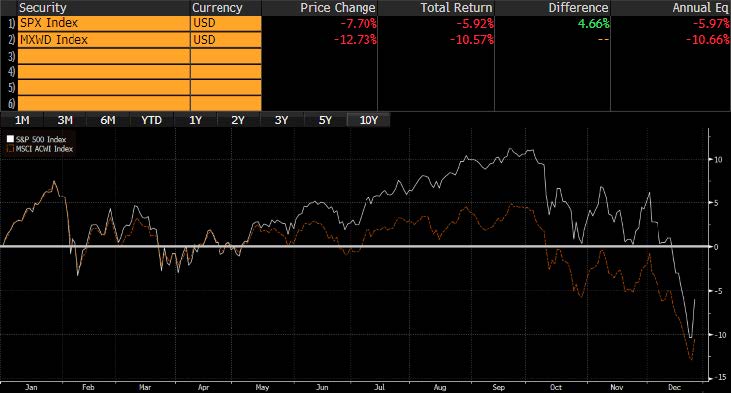
MAP Views Special Edition: Happy New Year!?
Dec 27, 2018As 2018 wraps up, financial markets are in turmoil. U.S. stock prices are on track to have the worst December since the Great Depression, putting 2018 on track to be the worst year for stocks since the financial crisis of 2008. Ironically, global stocks have been under pressure for most of the year, while U.S. stocks held up fairly well until the most recent quarter.

The primary question from investors is “what has changed in the past quarter?” To put things in perspective, the S&P 500 peaked just three short months ago. While the economy has shown some signs of slowing, it doesn’t appear to be crashing, so why are stock prices?
While the stock market tends to look forward rather than backward, the reaction to the downside so far appears to be somewhat overdone. To that end, it is important to note that approximately 85% of all trading today is considered to be on ‘autopilot.’ In other words, machines, models, algorithms, or passive investment formulas are the driving force behind trades, not humans. Many of these pre-programmed trades are creating extreme volatility at break-neck speed and are fueled by momentum. This means that as stocks go higher more buyers pile in; conversely, on the downside, selling takes on a snowball effect. For some time now, we have been concerned about indexing and the ‘follow the herd’ mentality. We have been preparing for this by structuring portfolios with a high active share (meaning portfolios that do not mimic the indices).
Stocks began selling off in October when Fed Chairman Jay Powell hinted at more interest rate hikes coming down the pike. On December 19th, the Fed reduced the number of expected rate hikes to two from three in 2019. Given recent market weakness and signs of an economic slowdown, we would not be surprised to see just one increase in 2019 or, furthermore, if increases were finished for this period of tightening. As we have stated previously, our weighted average maturity for bond holdings has been fairly consistent at just over a year, and we have been keeping our maximum maturity at two years. However, we did recently nudge maturities out a bit, given our beliefs that interest rate hikes will be put on hold for a while.
On the fundamental side, we have been prepared for an economic slowdown for quite some time. Recall, that we have long been in the camp of 2% GDP (give or take). Second quarter’s GDP reading north of 4% was an aberration, in our opinion. Accordingly, we have been overweight the uneconomically sensitive sectors such as the consumer staples while underweighting those sectors that typically do best in a stronger economic environment.
While the odds of a recession have increased over the past quarter, we still believe that the economy can grow in 2019. Trade negotiations with China are a big swing factor. If the 90-day cooling off period expires and an agreement is not reached leading to a full-blown trade war, the odds of a recession dramatically increase. If cooler heads prevail and an agreement is struck that prevents a trade war, then the probablities of a recession are reduced.
This recent market decline has created some attractive values in the marketplace and we are using some of the cash in our Global Equity portfolios to take advantage of the lower prices. We have gradually been increasing our exposure to emerging markets (EM). Our EM weighting stood at a mere 2% at mid-year and now stands at around 6%. Between stock market declines and lower currency prices, many EM stocks are down north of 40 percent for the year, creating what we believe is an attractive hunting ground for value investors.
The bottom line is that no one can control short-term market movements. Computer-driven trading is a sign of the times. While it is frustrating to experience exacerbated moves over a short period, we don’t believe that it detracts from the long-term merits of stock investing. We continue to believe that a well-constructed portfolio can offer long-term reward in today’s computer-driven reality.
Best wishes for a happy, healthy, and prosperous New Year.
Managed Asset Portfolios’ Investment Team
Michael Dzialo, Karen Culver, Peter Swan, John Dalton, and Zachary Fellows
December 27, 2018
The information contained herein represents our views as of the date above and does not represent a recommendation by us to buy or sell any security or securities mentioned. Past performance is no guarantee of future results.


